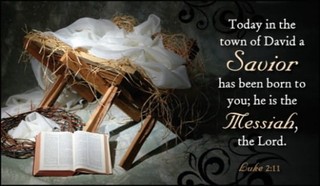- Recent Translations
- All Translations
Luke 2:34
Share
Settings
Luke 2:34 in Other Translations
Luke 2:34 Meaning and Commentary
And Simeon blessed them
Pronounced them blessed persons, on account of their relation to Christ as man; and more especially, because of their interest in him, as the, Saviour and Redeemer of them; and wished them all happiness and prosperity inward and outward, temporal, spiritual, and eternal; and so the Arabic version renders it, confining it to Joseph and Mary; "and Simeon blessed them both"; though this blessing of his may take in also the young child Jesus; whom he might pronounce blessed, as Elizabeth before had done, ( Luke 1:42 ) since he was the promised seed, in whom all nations of the earth should be blessed; and to whom, and to whose undertakings, interest, and kingdom, he might wish all prosperous success. The Persic version reads, "old Simeon: and said unto Mary his mother": he directed his discourse to her, because she was the only real parent of this child he had in his arms, and had said so much of, and was about to say more; and because part of what follows, personally concerned her:
behold, this child is set for the fall and rising again of many in
Israel.
The word "child", is not in the original text; where it is only, "this is set" Simeon seeming to be, as it were, at a loss, what name to call this great and illustrious person by, and therefore it is left to be supplied. The Persic version supplies it thus, behold, "this Holy One is set" The sense is, that this child, who is the stone of Israel, is set, or put, or lies, both as a stone of stumbling, and rock of offence, for many of the Jews to stumble at, and fail and perish; and as a precious corner and foundation stone, for the erection and elevation of others of them, to the highest honour and dignity, that shall believe on him: for these words are not to be understood of the same, but of different persons among the Jews; though it may be true, that some, who first stumbled at him, might be raised up again, and brought to believe in him; and that many, who for his sake, and the Gospel, fell under great disgrace and reproach, and into great afflictions and persecutions, were raised up to the enjoyment of great comfort and honour: but they are not the same persons that Christ is set for the fall of, that he is set for the rising of; nor the same he is set for the rising of, he is set for the fall of; the one designs the elect of God among the Jews, who became true believers in Christ; and the other, the reprobate, who died in impenitence and unbelief: the words, so far as they concern Christ, "being set for the fall of many of the Jews"; have a manifest reference to ( Isaiah 8:14 Isaiah 8:15 ) where the Messiah is spoken of as a stone, and as a stone of stumbling, and rock of offence; at which, many of the Jews should stumble, and fail, and be broken. And so the text is applied in the Talmud F13, where it is said, that
``the son of David will not come, until both houses of the fathers, fail out of Israel; and they are these, the head of the captivity in Babylon, and the prince in the land of Israel; as it is said, ( Isaiah 8:14 ) "he shall be for a sanctuary; but for a stone of stumbling and rock of offence", to both the houses of Israel.''Accordingly the Jews did stumble at his birth, parentage, and education; at the meanness of his person, and the obscurity of his kingdom; at the company he kept, and the audience that attended him; at his doctrine and miracles, and at his sufferings and death: they fell, through their unbelief and rejection of him, as the Messiah; and not only from their outward privileges, civil, and religious; the Gospel was taken away from them, the national covenant between God and them was broken, and they ceased to be his people, their temple and city were destroyed, and wrath came upon their nation to the uttermost; but they also fell into everlasting perdition, dying in their sins, through their disbelief of Jesus as the Messiah: this indeed was not the case of all of them; there was a seed, a remnant, according to the election of grace but it was the case of many, and of the far greater part but then this same stone that was laid in Zion, was also
set for the rising again of many
of them; meaning not for their resurrection in a literal sense, though this is a truth: for as all God's elect, whether Jews or Gentiles, rose in him representatively, when he rose from the dead; so many of them rose personally after his resurrection, and all of them, at the last day, will rise again, in consequence of their union to him: and indeed, all the wicked will be raised again, by virtue of his power; but not this, but their resurrection in a spiritual sense, is here meant; and it supposes the persons raised to have been in a low estate, as all God's elect by nature are: they are in a hopeless and helpless condition in themselves: they are in a state of thraldom and bondage, to sin, Satan, and the law; they are filled with diseases, nauseous, mortal, and incurable; they are clothed in rags, and are beggars on the dunghill; they are deep in debt, and have nothing to pay; and are dead in trespasses and sins. Christ is now provided and appointed, for the raising them up out of their low estate, and he does do it; he is the resurrection and the life unto them; he raises from the death of sin, to a life of grace and holiness from him, to a life of faith on him, and communion with him here, and to eternal life hereafter: he pays all their debts clothes them with his righteousness, heals all their diseases, redeems them from the slavery of sin, the captivity of Satan, and the bondage and curse of the law; brings them into a hopeful and comfortable condition; raises them to the possession of a large estate, an eternal inheritance; and gives them both a right unto it, and ineptness for it; sets them among princes, makes them kings, places them on a throne of glory, yea, on his own throne, and sets a crown of righteousness, life, and glory, on their heads; and will cause them to reign with him, first on earth, for a thousand years, and then in heaven to all eternity: and this was to be the case of many in Israel, though not of all; for all did not obey the Gospel, some did, three thousand under one sermon; and more will in the latter day, when all Israel shall be saved. This privilege of rising again, in this sense, by Christ, though it is here spoken of with respect to many of the Jews, yet not to the exclusion of the Gentiles; for this honour have all the saints, be they of what nation they will. Now when Christ is said to be "set" for these different things, the meaning is, that he was foreappointed, preordained, and set forth in God's counsel, purposes, and decrees, as a stone at which some should stumble, through their own wickedness and unbelief, and fall and perish, and be eternally lost; and as a foundation stone for others, to build their faith and hope upon, which should be given them, and so rise up to everlasting life; and that he was set forth in the prophecies of the Old Testament, as in that here referred to, for the same ends; and that he was now exhibited in human nature with the same views, and should be held forth in the everlasting Gospel, for the like purposes; and which eventually is the savour of life unto life to some, and the savour of death unto death to others: to all this, a behold is prefixed, as expressing what is wonderful and surprising, and not to be accounted for, but to be resolved into the secret and sovereign will of God: it is added, that he is also set
for a sign which shall be spoken against:
referring to ( Isaiah 8:18 ) . Christ is the sign of God's everlasting love to his people, the great proof, evidence, and demonstration of it; and in this respect, is spoken against by many: and he is set up in the Gospel, as an ensign of the people to look at, and gather to, for comfort, peace, righteousness, salvation, and eternal life; but is by many contradicted, opposed, and treated with contempt and abhorrence; so that he appears rather to be set as a mark and butt to shoot at: he was spoken against by the Scribes and Pharisees, and the greater part of the people of the Jews, and contradicted, as the Messiah, because of his mean appearance among them; his proper deity was denied, his divine sonship was gainsayed; he was contemned in all his offices, kingly, priestly, and prophetic; his works of mercy, both to the bodies and souls of men, his miracles, and the whole series of his life and actions, were traduced as sinful and criminal: this was the contradiction of sinners against himself, which he endured, ( Hebrews 12:3 ) and for which he was set and appointed; and still the contradiction continues, and will, as long as the Gospel is preached.
F13 T. Bab. Sanhedrin, fol. 33. 1.


